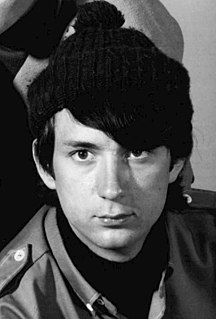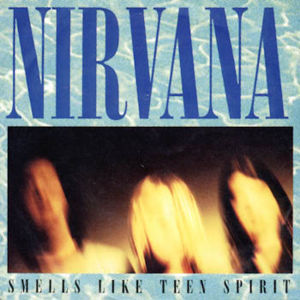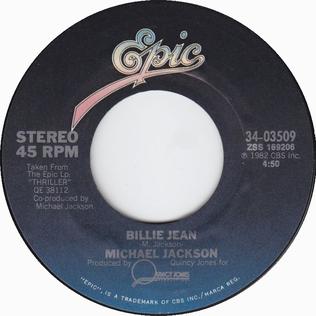Related Research Articles

Robert Michael Nesmith was an American musician, songwriter, actor, producer, and novelist. He was best known as a member of the pop rock band the Monkees and co-star of the TV series The Monkees (1966–1968). His songwriting credits include "Different Drum", which became a hit for Linda Ronstadt and the Stone Poneys.

The Monkees were a rock and pop band, formed in Los Angeles in 1966, whose line-up consisted of the American actor/musicians Micky Dolenz, Michael Nesmith and Peter Tork alongside English actor/singer Davy Jones. The group was conceived in 1965 by television producers Bob Rafelson and Bert Schneider for the situation comedy series of the same name. Music credited to the band was released on LP, as well as being included in the show, which aired from 1966 to 1968.

"Smells Like Teen Spirit" is a song by American rock band Nirvana. It is the opening track and lead single from the band's second album, Nevermind (1991), released on DGC Records. The unexpected success of the song propelled Nevermind to the top of several albums charts at the start of 1992, an event often marked as the point when grunge entered the mainstream.

"Billie Jean" is a song by American singer Michael Jackson, released by Epic Records on January 2, 1983, as the second single from Jackson's sixth studio album, Thriller (1982). It was written and composed by Jackson and produced by Jackson and Quincy Jones. "Billie Jean" blends post-disco, rhythm and blues, funk and dance-pop. The lyrics describe a woman, Billie Jean, who claims that the narrator is the father of her newborn son, which he denies. Jackson said the lyrics were based on groupies' claims about his older brothers when he toured with them as the Jackson 5.

"Losing My Religion" is a song by the American alternative rock band R.E.M. The song was released as the first single from the group's 1991 album Out of Time. Built on a mandolin riff, "Losing My Religion" was an unlikely hit for the group, garnering extensive airplay on radio as well as on MTV and VH1 due to its critically acclaimed music video. The song became R.E.M.'s highest-charting hit in the United States, reaching No. 4 on the Billboard Hot 100 and expanding the group's popularity beyond its original fanbase. At the 1992 Grammy Awards, "Losing My Religion" won two awards: Best Short Form Music Video and Best Pop Performance by a Duo or Group with Vocal.

"Come as You Are" is a song by American grunge band Nirvana, written by frontman and guitarist Kurt Cobain. It is the third track and the second single from the band's second studio album Nevermind, released in March 1992. It was the band's second and last American top 40 hit, reaching number 32 on the Billboard Hot 100, and second UK top 10 hit, reaching number nine on the UK Singles Chart. The single reached the top 10 in eight countries and the top 40 in eleven further countries.

"Heart-Shaped Box" is a song by American rock band Nirvana, written by vocalist and guitarist Kurt Cobain. It was released as the lead single from Nirvana's third and final studio album, In Utero, in August 1993, and appears as the third track. It was one of two songs from the album mixed by Scott Litt to augment the original production by producer Steve Albini.

"All the Small Things" is a song by American rock band Blink-182. It was the second single and eighth track released from the band's third album, Enema of the State (1999). The track was composed primarily by guitarist and vocalist Tom DeLonge as an ode to his then girlfriend. Recorded in Los Angeles with producer Jerry Finn, the song was created with the intention of shipping it to radio, as the trio felt they needed a single "really catchy and basic."

"Spirit in the Sky" is a song by American singer-songwriter Norman Greenbaum, originally written and recorded by Greenbaum and released in late 1969 from the album of the same name. The single became a gold record, selling two million copies from 1969 to 1970, and reached No. 3 on the US Billboard Hot 100 where it lasted for 15 weeks in the Top 100. Billboard ranked the record the No. 22 song of 1970. It also climbed to No. 1 on the UK, Australian and Canadian charts in 1970. Rolling Stone ranked "Spirit in the Sky" No. 333 on its list of the "500 Greatest Songs of All Time". Cover versions by Doctor and the Medics and Gareth Gates have also made the No. 1 spot in the UK.

"Rock with You" is a song recorded by American singer Michael Jackson. It was written by Rod Temperton and produced by Quincy Jones. It was first offered to Karen Carpenter, while she was working on her first solo album, but she turned it down. It was released on November 3, 1979, by Epic Records as the second single from Jackson's fifth solo studio album Off the Wall (1979). It was also the third number-one hit of the 1980s, a decade in which the pop singles chart would quickly be dominated by Jackson.

The Monkees is the debut studio album by the band the Monkees. It was released in October 1966 by Colgems Records in the United States and RCA Victor in the rest of the world. It was the first of four consecutive U.S. number one albums for the group, taking the top spot on the Billboard 200 for 13 weeks, after which it was displaced by the band's second album. It also topped the UK charts in 1967. The Monkees has been certified quintuple platinum by the RIAA, with sales of over five million copies.

"Daydream Believer" is a song composed by American songwriter John Stewart shortly before he left the Kingston Trio. It was originally recorded by the Monkees, with Davy Jones singing the lead. The single reached No. 1 on the U.S. Billboard Hot 100 chart in December 1967, remaining there for four weeks, and peaked at No. 5 on the UK Singles Chart. It was the Monkees' third and last No. 1 hit in the U.S.

"Jam" is a single by American singer-songwriter Michael Jackson. The song is the fourth single from his 1991 album Dangerous, where it is the opening track. It also appears as the second track on his 2009 This Is It compilation album. The single was re-released in 2006 as part of Jackson's Visionary: The Video Singles collection campaign, and it was remixed to the Cirque du Soleil's Immortal World Tour, releasing that remix on the soundtrack album. "Jam" is a new jack swing song whose bridge features a rap verse performed by Heavy D, though no credit to him appears on the album. The music video of the song featured NBA basketball legend Michael Jordan. The song was also featured on the Chicago Bulls 's 1992 NBA Championship video "Untouchabulls" and was also used in many promotional ads of the NBA in the said season. The single peaked at #26 on the Billboard Hot 100. The song re-entered the UK Singles Chart in 2006, reaching number 22.

"Different Drum" is a song written by American singer-songwriter Michael Nesmith in 1964. It was first recorded by the northern bluegrass band The Greenbriar Boys and included on their 1966 album Better Late than Never! Nesmith offered it to the Monkees, but the producers of the TV show, who had wide control over the group's musical output early on, turned him down.

"Valleri" is a song written by Tommy Boyce and Bobby Hart for the Monkees. The single reached #3 on the Billboard Hot 100 and spent two weeks at #1 on the Cash Box chart in early 1968. The song also rose to #1 in Canada and #12 in the UK.

"Give In to Me" is the tenth track on Michael Jackson's 1991 studio album, Dangerous. The single peaked at number one in Ireland and in New Zealand for four consecutive weeks, and at number two on the UK Singles Chart. Stylistically, "Give In to Me" is a hard rock ballad that featured Guns N' Roses guitarist Slash, who also had solos on "D.S.", "Morphine" and "Privacy". Some suggest that the song, also considered a heavy metal ballad, has an aggressive sexual flavor. The single was released in Europe, Australia and New Zealand only. The single release's B-sides include the album versions of "Dirty Diana" and "Beat It".

"A Little Bit Me, a Little Bit You" is a song written by Neil Diamond, recorded by the Monkees in 1967 and released as a single on the Colgems label. The lead vocal was Davy Jones' first on a Monkees single. The single reached No. 1 on the Cashbox Top 100 chart, while on the Billboard Hot 100 it reached No. 2, with "Somethin' Stupid" by Frank Sinatra and Nancy Sinatra keeping it from the top spot.

"Beat It" is a song by American singer Michael Jackson from his sixth studio album, Thriller (1982). It was written by Jackson and produced by Jackson and Quincy Jones. Jones encouraged Jackson to include a rock song on the album. Jackson later said: "I wanted to write a song, the type of song that I would buy if I were to buy a rock song... and I wanted the children to really enjoy it—the school children as well as the college students." It includes a guitar solo by Eddie Van Halen.
"Mary, Mary" is a song written by Michael Nesmith and first recorded by the Paul Butterfield Blues Band for their 1966 album, East-West. Nesmith's band, the Monkees, later recorded it for More of the Monkees (1967). Hip hop group, Run–D.M.C., revived the song in the late 1980s, with an adaptation that appeared in the U.S. record charts.

Good Times! is the twelfth studio album by American pop rock band the Monkees. Produced mainly by Adam Schlesinger, the album was recorded to commemorate the band's 50th anniversary. It is the first Monkees studio album since Justus (1996), marking the longest gap between Monkees albums to date, and the first since the death of founding member Davy Jones. The album features surviving Monkees Micky Dolenz, Michael Nesmith, and Peter Tork, as well as a posthumous contribution from Jones. The album received generally positive reviews from music critics and reached number 14 on the Billboard 200, becoming the band's highest-charting album in 48 years.
References
- ↑ Amorosi, A.D. (December 21, 2021). "Michael Nesmith Remembered Through His Best Songs — With and Without the Monkees". Variety . Retrieved March 13, 2022.
- 1 2 3 Lewis, Randy (February 7, 1992). "Nesmith Was Also a Music Video Pioneer". Los Angeles Times . Retrieved March 13, 2022.
- ↑ Greene, Andy (July 10, 2013). "Q&A: Michael Nesmith on His Recommitment to the Monkees". Rolling Stone . Retrieved March 13, 2022.
- ↑ Kent, David (1993). Australian Chart Book 1970–1992. p. 214. ISBN 0-646-11917-6.
- ↑ "Michael Nesmith – Rio" (in Dutch). Single Top 100.
- ↑ "Michael Nesmith – Rio". Top 40 Singles.
- ↑ "Official Singles Chart Top 100". Official Charts Company.